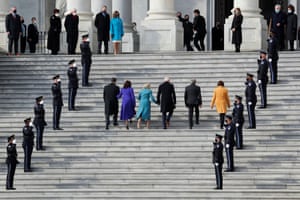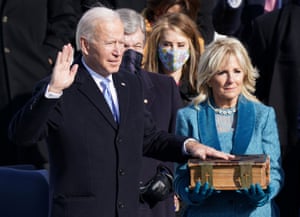Millions watch inauguration from home as chief justice administers oath of office at Capitol, two weeks after mob riot
Joseph Robinette Biden Jr has been sworn in as the 46th president of the United States, promising to marshal a spirit of national unity to guide the country through one of the most perilous chapters in American history.
Speaking under a bright winter sky, as snow flurries melted and the clouds parted, Biden declared “democracy has prevailed”, during a ceremony that marked the perseverance of a sacred ritual of American democracy at the US Capitol, where exactly two weeks ago a swarm of supporters loyal to his predecessor stormed the building in a violent but futile last stand to overturn the results of the election.
“Here we stand, just days after a riotous mob thought they could use violence to silence the will of the people,” Biden said, looking across the sprawl of the capital city’s national monuments, now guarded by a military garrison unprecedented in modern times, and devoid of spectators as a result of the coronavirus pandemic.
“To stop the work of our democracy. To drive us from this sacred ground. It did not happen. It will never happen. Not today, not tomorrow. Not ever,” he declared.
Biden promised to devote his “whole soul” to confronting the challenges ahead, as he inherited a country ravaged by disease, economic turmoil, racial inequality and political division.
“We will be judged, you and I, by how we resolve these cascading crises of our era,” he said. “Will we rise to the occasion? Will we master this rare and difficult hour?”
Donald Trump, who never formally conceded his defeat, left the White House on Wednesday morning and was not in attendance, a final display of irreverence for the traditions and norms that have long shaped the presidency. Mike Pence, the outgoing vice-president, was there, joined by the Clintons, the Bushes and the Obamas.
Fear and anxiety surrounded the lead-up to Biden’s inauguration. The threat of more violence resulted in the deployment of nearly 25,000 national guard troops, transforming the shining city upon a hill into a military fortress.
The pandemic had already greatly reshaped the inaugural events and ceremony, which typically draws hundreds of thousands of spectators to the National Mall. Much of the area was closed. Instead, flags from the states and territories represented those who the inaugural committee had urged to stay away, out of concern that large crowds would spread the coronavirus, which has now killed more than 400,000 Americans.
Part of Biden’s legacy was secured even before he placed his hand atop a large, 19th-century Bible, a family heirloom accented with a Celtic cross and held by his wife, Jill Biden. Biden, the vice-president to the nation’s first black president, elevated Kamala Harris as America’s first female, first Black and first Asian American vice-president.
“Don’t tell me things can’t change,” he said, marking explicitly the history of Harris’ ascension.
The ceremony was enlivened by musical performances. Lady Gaga gave a towering rendition of the national anthem, Jennifer Lopez arrestingly mixed patriotic paeans with the pledge of allegiance in Spanish – “indivisible, con libertad y justicia para todos” – and Garth Brooks asked Americans to join him in singing Amazing Grace.
The inauguration brings to a close one of the most volatile transitions in modern memory, an interregnum that tested the fragility of America’s commitment to an orderly and peaceful transition of power. For weeks after his defeat, Trump whipped up loyalists with baseless allegations of a stolen election.
His claims were dismissed by dozens of courts, security experts, Republican election officials and his then attorney general. But Trump refused to accept his fate, a decision that culminated two weeks ago in the assault on the US Capitol, where rioters attempted to stop Congress from certifying Biden’s win.
Trump left the national stage Wednesday morning, ending his historically unpopular presidency with a farewell event before departing on Air Force One for his south Florida resort in Mar-a-Lago. In his final remarks as commander in chief, he boasted that his presidency had been “amazing by any standard” and promised he would “be back in some form”.
Hours after being sworn in, Biden was expected to begin undoing what his chief of staff described as “the gravest damages” of his predecessor’s legacy. Biden will sign 15 executive orders, as well as a flurry of memorandums and decrees from the Oval Office, according to his top policy advisers.

He will also send a sweeping immigration bill to Congress and impose a national mandate requiring mask wearing in federal buildings and interstate travel.
Nearly half a century after he was sworn in as one of the nation’s youngest senators, he became the oldest president to take the oath of office, at 78.
A veteran of Washington first elected to the Senate in 1972, where he served until becoming vice-president under Barack Obama in 2009, Biden enters the White House with one of the deepest résumés in American political history, experience he will rely as he faces what he called “this time of testing”.
Loss and recovery have marked his long career in public service. His first wife and his daughter were killed in a car accident days after his election to the Senate. In 2015, he buried his eldest son, Beau, who died of brain cancer.
Biden’s rise to the presidency, the realization of a life’s dream, was paved with false starts and bad timing. A plagiarism scandal plagued his first run. Outshone by the history-making candidacy of his Democratic opponents in 2008, Hillary Clinton and Barack Obama, Biden bowed out before the Iowa caucuses. Then, in 2015, still mourning the loss of his son, Biden opted not to run.
But Trump’s presidency tormented him. Trump’s failure to forcefully condemn the white supremacist violence in Charlottesville, Virginia, in 2017 was Biden’s motivation for launching a third presidential bid.
Biden’s day began when he left the Blair House for a Catholic mass at the Cathedral of St Matthew the Apostle, where he was joined by the second couple and congressional leaders in a show of bipartisanship and ritual. Biden, a man of deep faith, will be only the second Catholic president, after John Kennedy.
Republican leadership, including outgoing Vice-president Mike Pence and Senate majority (soon to be minority) leader Mitch McConnell, attended Biden’s inauguration, not Trump’s farewell.

No comments:
Post a Comment